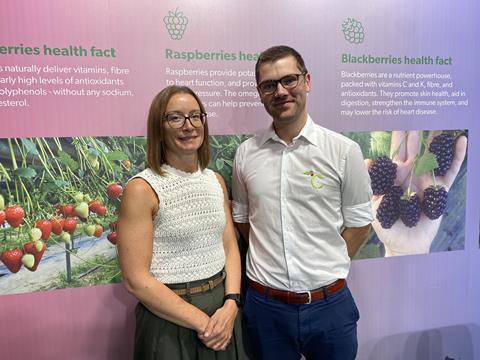Supermarkets now reportedly facilitating group meetings between breeders and competing soft fruit producers to share best practice and shore up supply

UK berry supply chains have become more coordinated – and, in some ways, less competitive – in the past couple of seasons as fruit shortages have become more common.
This is the assessment of major independent producer Chambers at a challenging period for the sector characterised by surging production costs, climate volatility and patchy availability. Security of supply is now a hot topic.
The producer told FPJ that against this challenging backdrop, berry producers have focused on developing more collaborative relationships – both internally, and with other growers, breeders, propagators, and retailers.
“Because there is more demand than supply at the moment, we can now be more collaborative,” says group CEO Vicky Rye. “There is not enough fruit so why fight? We can make the sector better for everybody.”
Collaboration, not competition
Chambers’ commercial manager Ben Norman told FPJ that some UK supermarkets are starting to facilitate group conversations among their supply bases.
They are inviting competing UK suppliers to meet up, share knowledge and experience, and speak to breeders – “to get the plant material correct and feed back on how it needs to be grown across the whole supply base, irrelevant of volumes and competition, to produce exactly the product the customer wants”.
Production director Salih Hodzhov says this is a “big change for the industry”, stressing that it is “still very early days”. But he sees it as a positive step for the sector as a whole.
“We [the suppliers] don’t feel like competitors in those meetings, and I think it’ll work better for everybody. We’re all aiming for the same thing – to deliver consistent fruit for the customer. It’s what we’re all here for.”
Switching to a pull model
He added that internally Chambers is also operating more collaboratively than before. “Before, the farms could operate more independently of the commercial and procurement teams because, to be honest, you could get away with a few little mistakes.
“Now we have to be so precise and always ask, if we produce here, what’s the demand? And what’s the procurement? It’s a pull model now. And it’s not only us. Every company is becoming more coordinated and efficient.”
A number of UK soft fruit growers have exited the sector in the past two years due to unsustainable cost pressures, insufficient retail returns, and in some cases, issues with succession.
According to Rye, the UK growers worst affected and most at risk are those that don’t have control over their pricing and don’t know they have to make changes until it is too late – because they sell their fruit through a marketing desk.
Meanwhile, Chambers’ managing director Tim Chambers described the UK berry category as “more of a sellers’ market” at the moment due to the lower availability of fruit, higher prices, and a slight shift in the power balance between producers and retailers.
Premium supply gaps
The flipside of that of that is the impact supply gaps can have on sales momentum, particularly at seasonal shoulders.
In the premium segment, which most major producers are keen to grow, Norman says there is typically a supply gap in the autumn when the UK season ends and imports from Morocco, Spain and Portugal begin. A lack of premium varieties at key times in the seasonal calendar are part of the problem.
“We typically see brilliant sales all the way through the British summer. We build our customer base, sales grow and grow. But then we get to autumn. The UK season finishes, and imports aren’t ready yet. So we lose all those customers and then start again in the winter. That is frustrating the retailers.
“There’s a lot of discussion around how you deliver a consistent premium product. And the question is whether premium should mean ‘the best ever’ or just ‘the best at that time’. That’s where retailers differ in their opinion. ‘The best at that time’ is clearly a lot easier to manage.”



